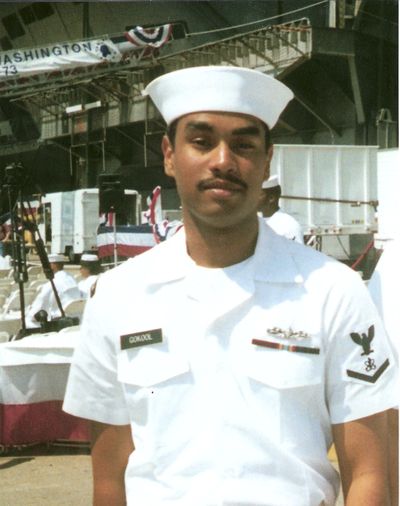USS Cole survivor found dead in his Florida home
Family says sailor had violent seizures

WEST PALM BEACH, Fla. – U.S. Navy Petty Officer 3rd Class Johann Gokool lost his left foot when a bomb ripped a hole in the side of the USS Cole nearly a decade ago, but the injury was nothing compared with the mental torment that ravaged him almost daily.
He returned home to Florida suffering severe post-traumatic stress disorder and frequent panic attacks so violent he would launch into seizures and even fractured his own wrist several times as he flailed, sister Natala Gokool said Tuesday.
One of the brothers he lived with found him dead in their home last Wednesday, just a week after his 31st birthday, Natala Gokool said. His cause of death was unknown, though she said foul play was not suspected. The family believes the seizures became too much for his body to handle.
Gokool was an electronic warfare technician aboard the Cole when suicide bombers rammed a small boat packed with explosives into it on Oct. 12, 2000, during a refueling stop in Aden, Yemen. It triggered a string of deadly fires. Seventeen U.S. sailors were killed and 39 others injured.
His sister said he soon began having panic attacks.
“Every year around the anniversary of the attack on the Cole, it seemed to get worse and more violent and more frequent,” she said.
Gokool recalled her brother as a “fun-loving, outgoing, friendly, generous-to-a-fault type of person,” even after the bombing.
Born in Trinidad, he moved with his family to South Florida as a young boy and joined the military right out of high school.
He was in the ship’s mess hall during the attack.
“When the explosion went off, everything was in slow motion, like a movie,” Gokool told the Miami Herald in 2005. “My body spun around and I could smell smoke and fuel.”
After being knocked unconscious, Gokool said he woke up and slowly dragged himself up a ladder to rescue.
“I don’t want to die here,” he said he thought to himself.
Doctors later removed his badly injured left foot, and he was visited in the hospital by then-President Bill Clinton.
“The president … told me to hang in there,” Gokool told the Herald.
Gokool lived in Homestead, about 35 miles southwest of Miami.
His sister said the lost foot “didn’t really have any effect on him once the physical wound healed.”
It was the panic attacks that scarred him. He couldn’t work and stayed home when he felt them coming on, which was sometimes too often for him to live any normal life. He played cards occasionally and video games, and chatted often on the Internet with friends. He and his sister would go to the movies just about every Tuesday, but only when he felt comfortable there were no panic attacks looming.
“We saw every specialist you could think of but nobody knew what was causing it. They could just rule things out,” his sister said.
While Gokool’s death was sudden, “my parents and my brothers and I always knew that unless somebody could figure out what was wrong with him, it would probably kill him,” she said. “A part of us always knew that would be his demise.”